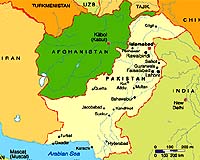| . |  |
. |
Kabul (AFP) May 19, 2009 At a dusty complex outside the Afghan capital Kabul, hundreds of police officers are being driven through basic training, taught how to patrol, enact the law and dispense first aid. Under the watchful eye of a private US contracting company -- which declined to speak publicly to reporters -- around 420 recruits are put through their paces over eight weeks, to prepare for one of Afghanistan's most dangerous tasks. "Right now, it's very, very dangerous to be a police officer," Brigadier General Khadadad Agha told reporters, as whistles shrilled and commanders barked orders at a clutch of recruits on a white gravel parade ground. "The problems we face are due to the fact that police don't get the training or the equipment that is adapted to their needs," he said. Dozens of officers have been killed in insurgent attacks this year, some in suicide bombings, others shot at checkpoints that dot major cities across the strife-torn country, gripped by increasingly deadly Taliban violence. But as police die on the frontline of the US-led fight against extremists, EU nations bicker over how to bolster Afghan police training while officials say recruits lack the weapons and techniques to protect themselves. Taliban-led insurgents or Al-Qaeda fighters can be armed with rockets, suicide vests and car bombs. A policeman on the beat in Afghanistan has handcuffs, a baton, and the cold comfort of an old AK-47 assault rifle. "More police are killed than army soldiers because our officers are on the frontline," said Esmatulla Alizai, police chief in the relatively calm western Herat province, where just 2,600 officers police about four million people. "The international community should increase its support in order to help cut down on the number of police casualties." As presidential and provincial elections approach in August -- a poll seen as a key test of Western-led efforts to foster democracy and help reconstruct Afghanistan after decades of war -- many fear that unrest will grow. At least six EU nations agree in principle to allow their joint paramilitary police team to help train the Afghans in the more robust techniques needed to defend themselves against conventional and suicide attacks. But the process is taking time. Nations, including the United States, have disagreed over whether the European Union or NATO should take final responsibility and on how the gendarmes would be protected. Yet the need for such training could not be more stark. Afghan police "are getting killed every day" said EU police mission (EUPOL) chief Kai Vittrup. "The only way forward is training in paramilitary techniques and, after that, basic police training. This is the only way they can survive," he said. In special courses over a three-week period, instructors plan to train about 500 officers especially for the elections. But they face huge obstacles, not least illiteracy and poverty. Officials say roughly two out of every three police cannot read or write. "They are not illiterate because they are stupid, they are illiterate because they never got the chance to go school," Vittrup said. "There's a long way to go for them to be police officers." EUPOL staff say it takes at least four months to bring a recruit up to the point where they can read enough to carry out the most basic tasks. Money too is a major consideration. Internal corruption has been cut down by ensuring that officers are paid directly into their accounts, rather than in cash, which can be skimmed off by their superiors. But police putting their lives at risk every day are sometimes tempted by bribes and a few are known to have demanded money from drivers. "If you consider the salary of a policeman on a checkpoint, he earns only 6,000 Afghanis (around 120 dollars) per month. How can he expect to pay his living costs?" said Alizai. "Even Al-Qaeda gives around 10,000 Afghanis to their fighters and they can make more money on the side through kidnappings," Alizai said. Despite the very obvious dangers, the Kabul recruits were obviously proud of their new jobs in a country where unemployment is rife. "I have to protect my country so foreigners don't come and do it for me," Abdul Malik, a recruit in one classroom, said, perhaps emboldened by the presence of the brigadier general and around 30 classmates. Share This Article With Planet Earth
Related Links News From Across The Stans
 Commentary: From AFPAK to PAKAF
Commentary: From AFPAK to PAKAFWashington (UPI) May 18, 2009 Barely born, AFPAK, the acronym for Afghanistan and Pakistan as a single theater of operations, has already been displaced. Pakistan is now the most dangerous of the two theaters, or PAKAF. The heart of Islamic extremism lies in Pakistan. Almost all terrorist trails in Britain track back to Pakistan. From independence in 1947 to the Soviet defeat in Afghanistan in 1989, Pakista ... read more |
|
| The content herein, unless otherwise known to be public domain, are Copyright 1995-2009 - SpaceDaily. AFP and UPI Wire Stories are copyright Agence France-Presse and United Press International. ESA Portal Reports are copyright European Space Agency. All NASA sourced material is public domain. Additional copyrights may apply in whole or part to other bona fide parties. Advertising does not imply endorsement,agreement or approval of any opinions, statements or information provided by SpaceDaily on any Web page published or hosted by SpaceDaily. Privacy Statement |